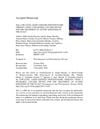 7 citations,
December 2015 in “Journal of thermal biology”
7 citations,
December 2015 in “Journal of thermal biology” Scalp cooling devices need to be powerful enough to overcome heat loss and reach the right temperature to prevent hair loss from chemotherapy.
 6 citations,
November 2018 in “Photodiagnosis and Photodynamic Therapy”
6 citations,
November 2018 in “Photodiagnosis and Photodynamic Therapy” A wearable cap-like device using light therapy reduced scalp skin lesions by 71% and was painless.
 2 citations,
January 2022 in “Journal of the American Academy of Dermatology”
2 citations,
January 2022 in “Journal of the American Academy of Dermatology” Virtual reality can reduce pain during scalp injections.
[object Object] November 2017 in “Expert review of quality of life in cancer care” Scalp cooling can help prevent or reduce hair loss from chemotherapy.
 December 2017 in “Actas Dermo-Sifiliográficas”
December 2017 in “Actas Dermo-Sifiliográficas” Scalp cooling reduces chemotherapy-induced hair loss without increasing risk of skin metastases.
25 citations,
March 2018 in “Journal of oncology practice” Scalp cooling is an effective and safe way to prevent hair loss from chemotherapy, with manageable side effects and low risk of scalp cancer.
 15 citations,
October 2017 in “Dermatologic Clinics”
15 citations,
October 2017 in “Dermatologic Clinics” New treatments for male hair loss show promise but need more research for safety and effectiveness.
 3 citations,
November 2018 in “Oncology issues”
3 citations,
November 2018 in “Oncology issues” Cancer survivors often experience worse skin problems from treatment than expected, and working with dermatologists could help improve their condition.
 62 citations,
February 2011 in “Expert review of dermatology”
62 citations,
February 2011 in “Expert review of dermatology” Scalp cooling can reduce chemotherapy-induced hair loss and should be available in all hospitals.
 52 citations,
May 2013 in “Supportive Care in Cancer”
52 citations,
May 2013 in “Supportive Care in Cancer” Scalp cooling significantly reduces hair loss in chemotherapy patients.
 39 citations,
January 1994 in “European Journal of Cancer”
39 citations,
January 1994 in “European Journal of Cancer” Scalp cooling is largely ineffective in preventing hair loss from breast cancer chemotherapy.
 19 citations,
June 2018 in “Breast Cancer Research and Treatment”
19 citations,
June 2018 in “Breast Cancer Research and Treatment” Scalp cooling effectively prevents severe hair loss in breast cancer patients treated with docetaxel and is safe.
 1 citations,
July 2023 in “Cutis”
1 citations,
July 2023 in “Cutis” Scalp rolling might help regrow hair in people with a hair loss condition called Alopecia Areata.
 March 2024 in “Research Square (Research Square)”
March 2024 in “Research Square (Research Square)” Scalp cooling therapy helps preserve hair during chemotherapy for most patients.
 4 citations,
January 2021 in “Dermatologic Therapy”
4 citations,
January 2021 in “Dermatologic Therapy” AI is effective in diagnosing and treating hair disorders, including detecting hair loss and scalp conditions with high accuracy, but it should supplement, not replace, doctor-patient interactions.
[object Object]  38 citations,
September 2017 in “Oncologist”
38 citations,
September 2017 in “Oncologist” Scalp cooling can help prevent chemotherapy-induced hair loss with a 50-90% success rate and is safe for patients.
37 citations,
October 2017 in “JEADV. Journal of the European Academy of Dermatology and Venereology/Journal of the European Academy of Dermatology and Venereology” Scalp cooling effectively reduces hair loss from chemotherapy.
 34 citations,
January 2018 in “International Journal of Dermatology”
34 citations,
January 2018 in “International Journal of Dermatology” Scalp cooling is the most effective FDA-approved method to prevent chemotherapy-induced hair loss, but more research is needed for other treatments.
17 citations,
June 2020 in “Anais brasileiros de dermatologia/Anais Brasileiros de Dermatologia” Scalp cooling is an effective way to prevent hair loss from chemotherapy.
 10 citations,
January 2019 in “Biomarker Insights”
10 citations,
January 2019 in “Biomarker Insights” Scalp cooling to prevent hair loss from chemotherapy works for some but not all, and studying hair damage markers could improve prevention and treatment.
6 citations,
June 2023 in “American Society of Clinical Oncology Educational Book” Cannabis, cryotherapy, and scalp cooling can help improve the quality of life for chemotherapy patients.
 1 citations,
January 2018 in “Springer eBooks”
1 citations,
January 2018 in “Springer eBooks” The document concludes that scalp cooling and treatments like minoxidil can help manage hair loss from cancer therapy.
 February 2023 in “Sibirskij onkologičeskij žurnal”
February 2023 in “Sibirskij onkologičeskij žurnal” Chemotherapy often causes hair loss in cancer patients, affecting their mental health, but scalp cooling can help prevent it.
 25 citations,
June 2020 in “Dermatology practical & conceptual”
25 citations,
June 2020 in “Dermatology practical & conceptual” Scalp cooling can help prevent hair loss from chemotherapy, but treatment should be tailored to the individual and more research is needed.
 218 citations,
January 2013 in “The Lancet Oncology”
218 citations,
January 2013 in “The Lancet Oncology” Chemotherapy causes hair loss by damaging hair follicles and stem cells, with more research needed for prevention and treatment.
 103 citations,
December 2011 in “Journal of the American Academy of Dermatology”
103 citations,
December 2011 in “Journal of the American Academy of Dermatology” Chemotherapy often causes temporary hair loss, which is distressing and needs better treatment and support.
 53 citations,
April 2018 in “Journal of The American Academy of Dermatology”
53 citations,
April 2018 in “Journal of The American Academy of Dermatology” Cancer treatments often cause hair disorders, significantly affecting patients' quality of life, and better management methods are needed.
 36 citations,
November 2018 in “American Journal of Clinical Dermatology”
36 citations,
November 2018 in “American Journal of Clinical Dermatology” Alopecia is linked to various health and mental conditions, impacts life quality, and needs medical attention beyond its cosmetic effects.
 26 citations,
August 2018 in “American Journal of Clinical Dermatology”
26 citations,
August 2018 in “American Journal of Clinical Dermatology” Hair loss in cancer patients can be related to the cancer itself, treatment, or other conditions, and understanding it is important for diagnosis and patient care.
 7 citations,
October 2019 in “Klinická onkologie”
7 citations,
October 2019 in “Klinická onkologie” Cancer treatments often cause hair loss and damage, affecting patients' mental health.

























